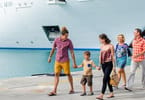Kurt Knackstedt:
Okay, Dionne, get your thoughts. From a travel manager perspective, what would you do now if you’re not already doing it to help simplify the travel program coming out of COVID?
Dionne Yuen:
Yeah, I think there are several elements would be very importantly how to come up with a simplified travel management. First of all, about the accuracy and the efficiency. For example, we actually have been helping those of our customers, how to optimize their business travel options, have to be compliant with the travel policy. For example, we have tools called the SmartMix. So, basically, the SmartMix tool is more like a machine learning technology that will help our customers to customize their travel policy by adding the best fare options. And then for the highest class, like [happy class 00:29:07] allowed or the budget, and then that will actually help in lots of our customers in order to complete an air booking with less than five minutes. Widely, 84% of the track flight booking will be shown in the top 10 search result in our tours.
So, basically, we will be providing efficiency will be very important. And then also talking about like accuracy, not just only we can provide different tools for the budget saving. And then I think more importantly, travel manager need to think of the importance of having a holistic view of the travel management especially when it comes to the COVID, if there is any disruption of travel caused by the COVID and then whether they will be able to access an immediate data, whether they will be immediately to track the travelers at the real time. And then it becomes a very late important expert that the travel managers should consider.
Kurt Knackstedt:
Excellent points. Thanks, Dionne. And then Paul, your thoughts again, what would be your recommendations for embracing this challenging time to come out with a simpler, more understandable travel program?
Paul dragi:
Yeah, well, I might just take a slightly different view that says, I think we need standards. I know we’ve touched on this before, but there needs to be an airline standard, there needs to be a hotel standard. And once there’s those standards in place, a travel manager can manage that risk and manage that risk. But until that happens, then the complexity in the industry continues and it needs to be done almost on a country by country and almost trip by trip basis. Where they’re going, where’s traveler heading, what a vaccination is needed, what’s the entry requirements and so on and so forth. So, technology today will be an absolute necessity and information gathering is an absolute necessity during the next sort of period of time.
But I guess the hope for the industry is that we end up with standards and those standards then applied by airlines, hotels, governments, entry requirements. And then we can get back to some sort of normality on managing it, managing your travel almost on a global basis. So, my hope is that we end up in that environment, but until then, it’s just get as much information as possible using the right tools to inform the travelers and to ensure that the travelers are traveling for necessity because until that sort of we come through this COVID period, necessity is going to be the key reason for travel, obviously.
Kurt Knackstedt:
Yeah, absolutely. Well, they say necessity is the mother of invention and that’s something that we’re certainly embracing now. There’s a lot of needed things to be done in the industry. So, but from a simplification perspective, again, some great perspectives from all of you. We talked about narrowing the channels in the short term to keep it simple for travelers, to know where to go to get information and support. We talked about ensuring that we had clarity around duty of care and sustainability as a primary method to keep it simple, say, “Look, make sure you’re comfortable with traveling that you’re healthy and safe when you’re traveling and that you’re doing it in a sustainable way.” Use technology to the best of our abilities without getting overly dependent on technology. And again, to your point, Paul, if we can get to some standards that help keep it consistent in how we manage these processes coming out of the pandemic, that would be a great result for the industry.
So although simple and travel management isn’t always used in the same sentence, we’ve done a pretty good job today to try to tackle it. So, my co-panelists, Florence, Dionne and Paul, thanks so much for your time and your perspectives. I hope that all of you watching from home and wherever you are have enjoyed this. I really appreciate you joining us today. And that wraps up our session.
#obnova potovanja
KAJ VZETI IZ TEGA ČLANKA:
- And then I think more importantly, travel manager need to think of the importance of having a holistic view of the travel management especially when it comes to the COVID, if there is any disruption of travel caused by the COVID and then whether they will be able to access an immediate data, whether they will be immediately to track the travelers at the real time.
- So, my hope is that we end up in that environment, but until then, it’s just get as much information as possible using the right tools to inform the travelers and to ensure that the travelers are traveling for necessity because until that sort of we come through this COVID period, necessity is going to be the key reason for travel, obviously.
- We talked about ensuring that we had clarity around duty of care and sustainability as a primary method to keep it simple, say, “Look, make sure you’re comfortable with traveling that you’re healthy and safe when you’re traveling and that you’re doing it in a sustainable way.






















